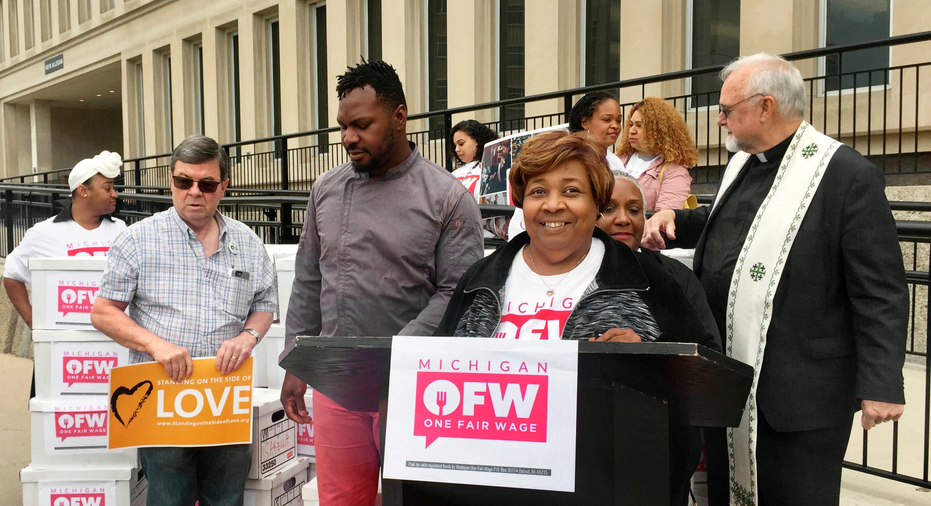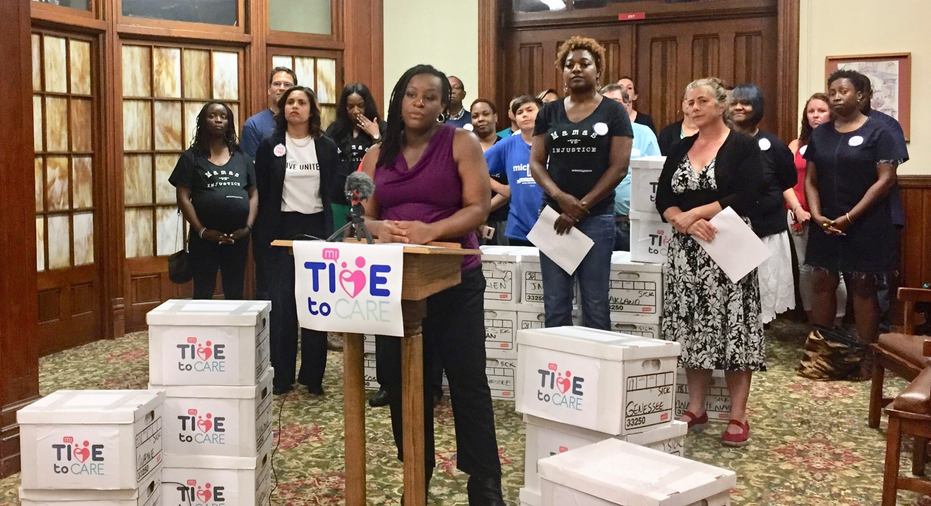GOP-led Legislature may stymie 2 Michigan ballot drives
LANSING, Mich. – Michigan Republicans may use a new tactic to stymie a pair of ballot initiatives that would raise the minimum wage and require paid sick leave: adopt the laws themselves ahead of the November election, then change those measures later.
The unprecedented strategy is being pushed within the GOP-led Legislature so it's easier to alter — Democrats say "gut" — the proposals with simple majority votes. If the public approves the measures, future amendments would require the support of three-fourths of both chambers.
The maneuver might also lead to fewer Democratic voters being driven to turn out at the polls.
Organizers of the ballot drives call it an underhanded effort to thwart the will of hundreds of thousands of people who signed their petitions. Business lobbyists say the move is necessary to make the initiatives more workable.
Lawmakers will have little time to debate the option when they return this coming week from a summer break. State election officials want to finalize the fall ballot by Friday.
The Time to Care proposal would make Michigan the 11th state to guarantee workers paid sick leave . The One Fair Wage measure would gradually increase the state's $9.25 minimum wage to $12 an hour by 2022 , with annual inflationary adjustments afterward, and gradually boost the minimum for tipped workers until it's the same as other employees by 2024.
Tracy Pease, a 47-year-old restaurant server from Hazel Park in suburban Detroit, helped gather signatures for the minimum wage initiative.
"The people said, 'We want this put to a vote, we want it on the ballot,'" she said. "This is the very reason why people are less likely to go out and vote because they feel, 'Hey, our voice ain't heard. They don't care. They're going to do what they want anyway.'"
But the strategy has the backing of business groups. Rich Studley, the president and CEO of the Michigan Chamber of Commerce, pointed to how lawmakers struggled to fix parts of a voter-approved medical marijuana law due to the three-quarters vote requirement in the state constitution.
Michigan's minimum wage is already rising under a 2014 law and is higher than in surrounding states. Studley said a bigger increase would lead to layoffs in the restaurant industry. The earned sick leave initiative, he said, is poorly written, conflicts with existing labor laws and would be an "administrative nightmare" for employers — many of which already provide paid sick days.
"Are you hell-bent to have a proposal on the ballot in November because you hope it will drive turnout one way or another or do you want to solve the problem?" Studley said.
Backers of the ballot drives counter that 1.7 million people in Michigan work without the ability to earn paid sick time, and boosting wages would help people make ends meet and give tipped workers more stable, predictable paychecks.
In Michigan, ballot proposals that are not constitutional amendments first go to the Legislature for consideration. When supporters gather enough signatures for a proposal to be certified, legislators can approve it or let it go to the ballot, sometimes with an alternative appearing alongside it.
Lawmakers have enacted citizen initiatives seven times since approval of the state's 1963 constitution but have never later attempted to substantially scale one of those back.
House Minority Leader Sam Singh, an East Lansing Democrat, said he would not be surprised to see legal challenges if Republicans use the enact-and-amend strategy.
"The framers of the constitution never thought the Legislature would try to do something as devious as that," he said. "That's just a form of voter suppression."
Republican Senate Majority Leader Arlan Meekhof said while he had not decided how to proceed, the maneuver would be legally sound. Passing a citizen-initiated measure creates a law, and legislators are empowered to change law on a regular basis. Spokeswoman Amber McCann said Meekhof believes it's better for lawmakers to pass citizen initiatives than to have them go to the ballot, "as it preserves the ability for amendment by simple majority in the future should the statute need to be changed to better reflect the needs of our economy and our state."
___
Follow David Eggert on Twitter at https://twitter.com/DavidEggert00 . His work can be found at https://apnews.com/search/David%20Eggert
___
Sign up for the AP's weekly newsletter showcasing our best reporting from the Midwest and Texas: http://apne.ws/2u1RMfv





















